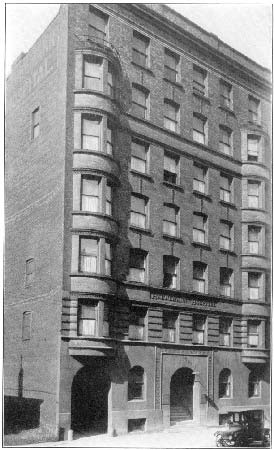Temple S Hoyne 1841 - 1899
June 20, 2008
 Temple S
Hoyne** 1841 -
1899
was **Professor of Materia Medica at the Hahnemann Medical College
of Chicago,
and also in charge of the venereal patients in the Scammon
Hospital.
Temple S
Hoyne** 1841 -
1899
was **Professor of Materia Medica at the Hahnemann Medical College
of Chicago,
and also in charge of the venereal patients in the Scammon
Hospital.
A number of Chicago’s most prominent citizens and politicians participated in the creation and furtherance of the proposed Hahnemann Medical College of Chicago including William H Brown, Joseph B. Doggett, John H. Dunham, George A. Gibbs, Thomas Hoyne (Temple’s father), Norman B. Judd, Orrington Lunt, George E. Shipman, M.D., David S. Smith, M.D., and John M. Wilson.
These ten men were named as trustees in the Act to incorporate the Hahnemann Medical College of Chicago…
Thomas Hoyne and Jonathan Young Scammon “were among the earliest of the homeopathic laymen.” Thomas Hoyne’s wife, Leonora, was the daughter of a prominent homeopath, Dr. John Taylor Temple. (and his grandson Temple was named after him).
Nothing had ever occurred in Dr. T.S. Hoyne’s lectures at Hahnemann Medical College of Chicago “to offend even the most modest woman in the land.”
In paying tribute to those responsible for the progress thus made (in founding the Hahnemann Medical College of Chicago), Dr. Howard Roy Chislett, sometime Dean, says:
“All honor to Doctors Reuben Ludlam, George A. Hall and Temple S. Hoyne. They are all dead now, but their memories are honored by their one-time students and we rejoice that they all lived sufficiently long to round out their useful lives, to prove their faith in their former students and supporters and to see their anticipations realized in the construction of our group of modern buildings…
Temple S Hoyne compiled a remedy picture of Chamomilla.
of Chicago, Ills., was born in that city, on October 16th, 1841. He is the eldest son of the Hon. Thomas Hoyne, LL. D., one of the eldest members of the Chicago bar. He is the grandson of Dr. John Taylor Temple of St. Louis, Mo.
He received his education in the University of Chicago, where he graduated in 1862, receiving the three degrees of B. S., M. S., and A. M. On his graduation, he attended two courses of lectures in the Bellevue Hospital Medical College, New York, receiving the degree of M. D. in February, 1865.
Previously to this, in 1862, he took a partial course in the Hahnemann Medical College of Chicago. His father having expressed a wish that he should pursue the practice of the law, he entered his office, but finding the study exceedingly distasteful, he gave himself to the study of medicine as the profession of his life.
Dr. Hoyne’s father, impressed with the belief that all boys should be taught a trade, encouraged his son to learn the art of printing. In accordance with this wish, he worked in the printing office of the Chicago Democrat half a day while attending school in his boyhood.
He then procured a small font of type, and, in 1858, printed a volume of one hundred pages -a novel written by his mother- and bound by his uncle. The edition numbered one hundred copies, and was printed on a common letter press.
The knowledge he thus acquired has always since been of great value to him, besides the recreation it affords him after the arduous labors of his profession.
In 1864, during the Civil War, he had charge of a hospital in Fredericksburgh, Va., in company with Dr. F. H. Hamilton of New York. The hospital contained three hundred men wounded in the Battle of the Wilderness.
Resuming his practice at the close of the war, he was elected, in 1869, Professor of Materia Medica in the Hahnemann Medical College of Chicago, and has delivered four courses of lectures before that school. This position he still maintains, with credit to himself, and with honor to the college.
In addition to his other duties, he has also the charge of the venereal patients in the Scammon Hospital. Dr. Hoyne is also the business manager and registrar of the college.
His literary contributions to his profession are a treatise on the use of Carbolic Acid ; ”Hoyne’s Materia Medica Cards ;” and a ”Repertory to the New Remedies.” He has contributed to the Hahnemann Monthly ; the United States Medical and Surgical Journal, the Medical Investigator, and the American Homœopathic Observer ; and is at this time one of the editors of Raue’s Annual Record.”
He was married in 1866. In all the departments he has filled, Dr. Hoyne has acquitted himself to the general approval. In his present position as professor in the college he is earning for himself an exalted reputation, while his publications upon various subjects have added largely to his renown as a physician thoroughly conversant with his subject. He is perfectly at home in both the theory and practice of homœopathy, and enjoys largely the confidence of his professional brethren.
Temple S Hoyne wrote Clinical Therapeutics, Venereal and Urinary Diseases, The Medical Visitor, and he contributed to numerous homeopathic journals.